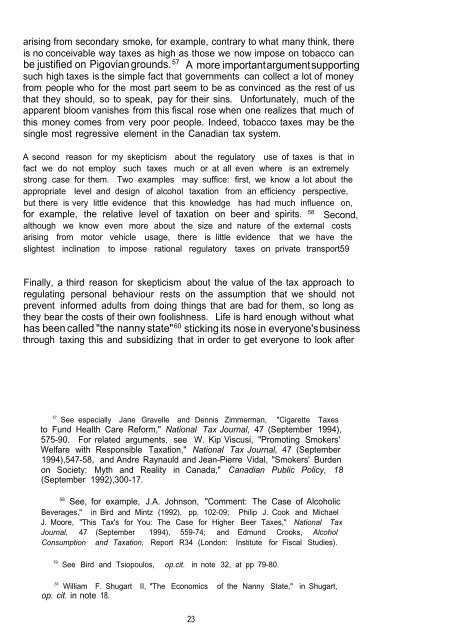Richard Bird - Institute for Public Economics - University of Alberta
Richard Bird - Institute for Public Economics - University of Alberta
Richard Bird - Institute for Public Economics - University of Alberta
Create successful ePaper yourself
Turn your PDF publications into a flip-book with our unique Google optimized e-Paper software.
arising from secondary smoke, <strong>for</strong> example, contrary to what many think, thereis no conceivable way taxes as high as those we now impose on tobacco canbe justified on Pigovian grounds. 57 A more importantargumentsupportingsuch high taxes is the simple fact that governments can collect a lot <strong>of</strong> moneyfrom people who <strong>for</strong> the most part seem to be as convinced as the rest <strong>of</strong> usthat they should, so to speak, pay <strong>for</strong> their sins. Un<strong>for</strong>tunately, much <strong>of</strong> theapparent bloom vanishes from this fiscal rose when one realizes that much <strong>of</strong>this money comes from very poor people. Indeed, tobacco taxes may be thesingle most regressive element in the Canadian tax system.A second reason <strong>for</strong> my skepticism about the regulatory use <strong>of</strong> taxes is that infact we do not employ such taxes much or at all even where is an extremelystrong case <strong>for</strong> them. Two examples may suffice: first, we know a lot about theappropriate level and design <strong>of</strong> alcohol taxation from an efficiency perspective,but there is very little evidence that this knowledge has had much influence on,58<strong>for</strong> example, the relative level <strong>of</strong> taxation on beer and spirits. Second,although we know even more about the size and nature <strong>of</strong> the external costsarising from motor vehicle usage, there is little evidence that we have theslightest inclination to impose rational regulatory taxes on private transport59Finally, a third reason <strong>for</strong> skepticism about the value <strong>of</strong> the tax approach toregulating personal behaviour rests on the assumption that we should notprevent in<strong>for</strong>med adults from doing things that are bad <strong>for</strong> them, so long asthey bear the costs <strong>of</strong> their own foolishness. Life is hard enough without whathas been called "the nanny state" 60 sticking its nose in everyone'sbusinessthrough taxing this and subsidizing that in order to get everyone to look after57See especially Jane Gravelle and Dennis Zimmerman, "Cigarette Taxesto Fund Health Care Re<strong>for</strong>m," National Tax Journal, 47 (September 1994),575-90. For related arguments, see W. Kip Viscusi, "Promoting Smokers'Welfare with Responsible Taxation," National Tax Journal, 47 (September1994),547-58, and Andre Raynauld and Jean-Pierre Vidal, "Smokers' Burdenon Society: Myth and Reality in Canada," Canadian <strong>Public</strong> Policy, 18(September 1992),300-17.58See, <strong>for</strong> example, J.A. Johnson, "Comment: The Case <strong>of</strong> AlcoholicBeverages," in <strong>Bird</strong> and Mintz (1992), pp. 102-09; Philip J. Cook and MichaelJ. Moore, "This Tax's <strong>for</strong> You: The Case <strong>for</strong> Higher Beer Taxes," National TaxJournal, 47 (September 1994), 559-74; and Edmund Crooks, AlcoholConsumption and Taxation, Report R34 (London: <strong>Institute</strong> <strong>for</strong> Fiscal Studies).59See <strong>Bird</strong> and Tsiopoulos, op.cit. in note 32, at pp 79-80.60William F. Shugart II, "The <strong>Economics</strong> <strong>of</strong> the Nanny State," in Shugart,op. cit. in note 18.23



